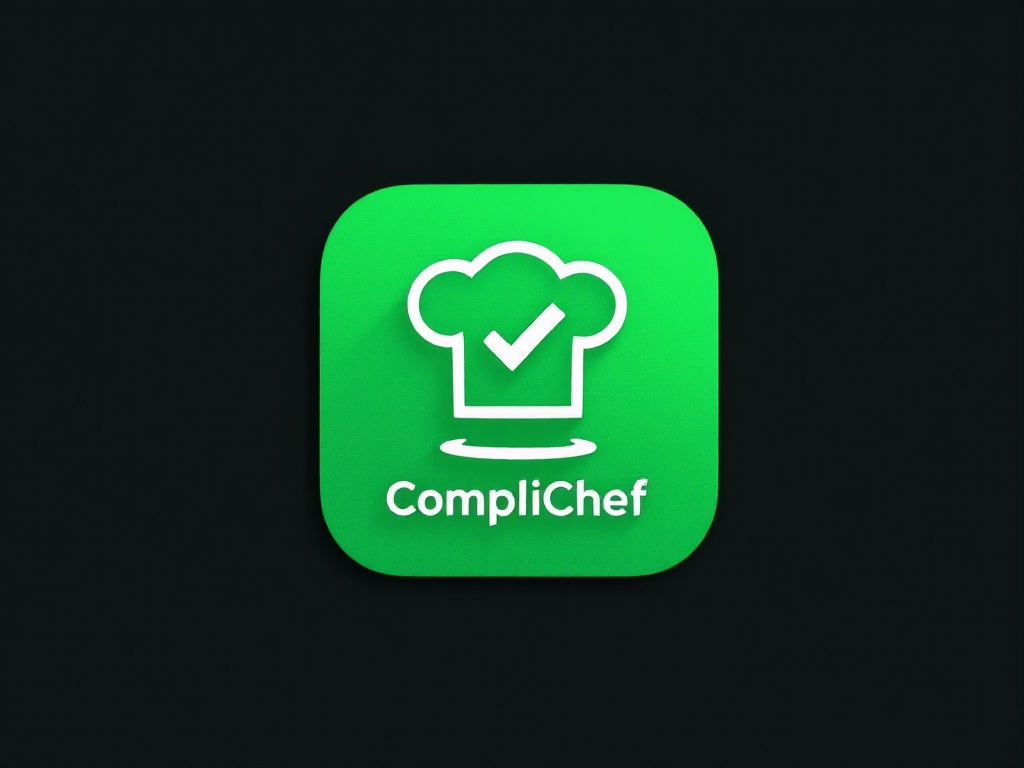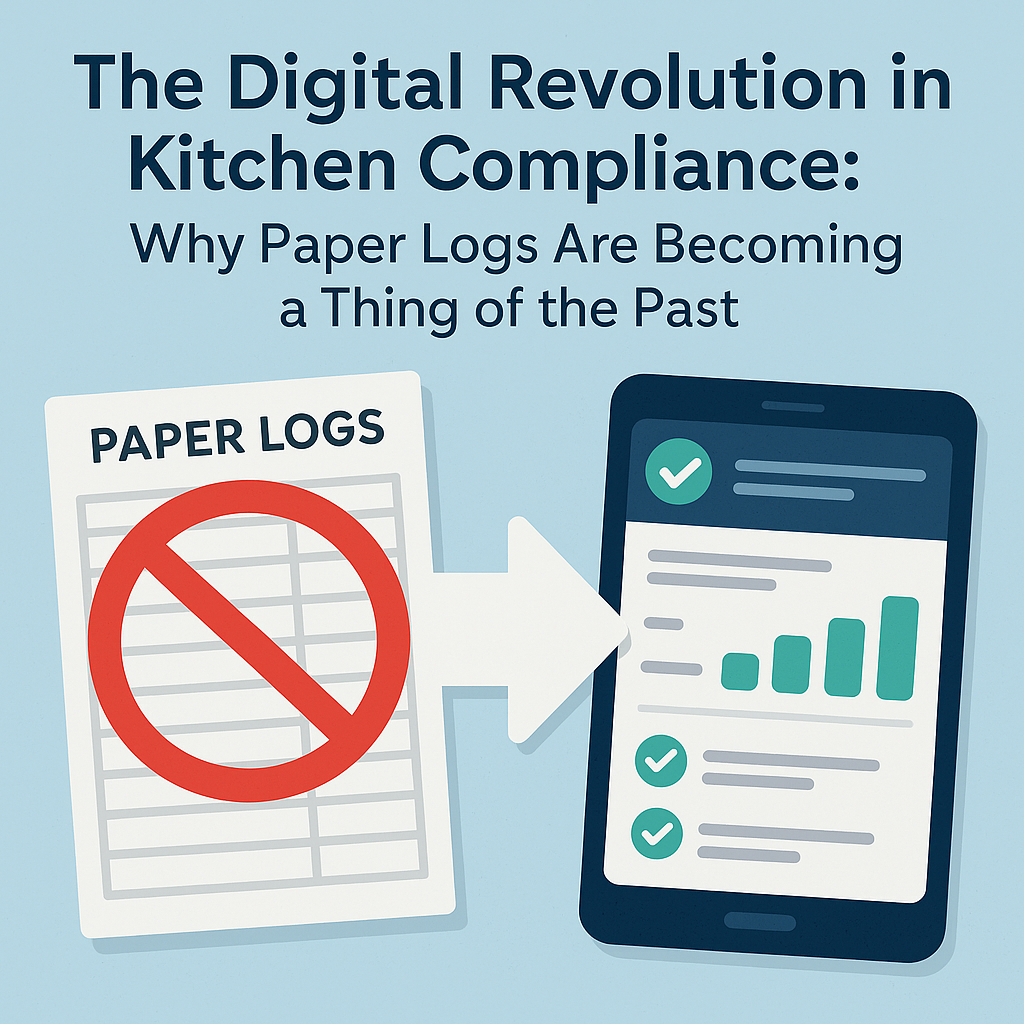The Digital Revolution in Kitchen Compliance: Why Paper Logs Are Becoming a Thing of the Past
There's a moment that every head chef knows too well. You're in the middle of a busy service, tickets are flying, your team's in the weeds, and suddenly you remember — did anyone check the fridge temps this morning? Was the delivery logged properly? Did the new starter actually complete their cleaning checklist?
You dash to the clipboard hanging by the walk-in, only to find half-filled forms, illegible handwriting, and that sinking feeling that if an EHO walked through the door right now, you'd be scrambling to explain why Tuesday's opening checks are mysteriously blank.
Sound familiar? You're not alone. For decades, kitchens across the UK have relied on paper-based food safety systems to manage compliance, and for decades, those systems have been quietly failing us. But something's changing. Digital compliance isn't just coming to commercial kitchens — it's already here, and it's transforming the way we think about food safety, team accountability, and what it actually means to run a professional kitchen in 2025.
The Problem with Paper (That Nobody Talks About)
Let's be honest about paper logs for a minute. They're cheap, they're familiar, and on the surface, they seem simple enough. But dig a little deeper and the cracks start to show.
First, there's the human factor. When your kitchen porter is juggling three jobs at once, it's easy for a temperature check to become a quick scribble — or worse, a retrospective guess at the end of shift. We've all seen it. Numbers that are suspiciously similar day after day. Forms filled in with the same pen, clearly done in one go. The classic "I'll do it later" that becomes "I'll do it never."
Then there's the storage nightmare. Lever arch files piled in the office, some dating back months or years, most gathering dust and grease stains. When the EHO asks to see your records from three months ago, you're left leafing through crumpled pages hoping you can find the right week.
But the real issue? Paper doesn't communicate. It doesn't remind you when tasks are missed. It doesn't alert you when something's gone wrong. It just sits there, passive and silent, until someone remembers to look at it — and by then, it's often too late.
And here's the uncomfortable truth: paper logs aren't designed for the reality of modern kitchens. They were created in a different era, before we understood just how critical traceability and real-time oversight actually are. They're a relic, and they're holding us back.
Enter the Digital Age
Over the past few years, something's shifted in the industry. Walk into any progressive kitchen today and you'll notice fewer clipboards and more tablets. Head chefs aren't flipping through folders — they're checking dashboards. Teams aren't guessing whether tasks are done — they're receiving instant confirmations.
Digital compliance systems have moved from "nice to have" to "essential," and it's not hard to see why. When your entire operation can be monitored from your phone, when your team gets automatic reminders, when temperatures, cleaning schedules, and delivery checks are all logged in real-time with timestamps and geolocation — suddenly, compliance stops being a chore and starts being a system that actually works.
The difference is profound. Instead of reacting to problems after they happen, digital systems let you prevent them. Instead of hoping your team is following procedures, you can see exactly what's happening, when, and by whom. And instead of drowning in paperwork during an inspection, you can pull up months of verified, timestamped records in seconds.
This isn't about replacing chefs with robots or turning kitchens into soulless tech hubs. It's about giving kitchen teams the tools they deserve — tools that make their jobs easier, their standards higher, and their lives less stressful.
How Digital Compliance Actually Works in Practice
So what does digital compliance look like day-to-day? Let's paint a picture.
Your kitchen manager arrives at six in the morning to open up. Instead of hunting for a clipboard, they open an app on their phone. The opening checklist is already there, tailored to their role. They work through each task — fridge temps, freezer temps, checking deliveries, verifying equipment. Each item is logged with a timestamp, and if something's outside the safe range, the system flags it immediately. No guesswork. No "I'll deal with it later."
Meanwhile, the head chef gets a notification. Fridge three is running slightly warm. They can see the exact temperature, the time it was recorded, and the team member who flagged it. They make a call, rearrange stock, and order a repair — all before service even starts. Crisis averted, not through luck, but through visibility.
Throughout the day, tasks get completed and logged. Cleaning schedules, allergen checks, stock rotation, everything flows through the system. At the end of service, instead of spending an hour filling in paperwork, your team clocks out knowing everything's already recorded. The head chef can review the day in minutes, spot patterns, and adjust processes.
And when the EHO arrives for an unannounced inspection? Instead of panic, there's confidence. Every log, every check, every temperature reading is available instantly, backed up in the cloud, timestamped and verifiable. The inspector can see that this isn't just a kitchen with good intentions — it's a kitchen with proven, consistent standards.
That's the power of going digital. It's not flashy, it's not complicated — it's just better.
Why CompliChef Was Built by Someone Who Gets It
Here's the thing about most compliance software: it's built by developers who've never worked a service, never felt the pressure of a health inspection, and never had to explain to a tired KP why filling in forms actually matters.
CompliChef is different. It was built by Nick, a head chef with nearly two decades in professional kitchens — from Toby Carvery to TGI Fridays to care homes. He's run busy services, managed teams, dealt with EHO visits, and lived through the chaos of paper-based compliance. He knows what works and what doesn't because he's been there, in the thick of it.
When Nick started building CompliChef, he wasn't trying to create the most feature-packed software on the market. He wanted to solve the actual problems he'd faced every day — the missed logs, the unclear responsibilities, the stress of inspections, the frustration of not knowing if standards were really being met.
The result is a system that feels like it was designed by someone who actually understands kitchens. Because it was. There's no bloat, no unnecessary complexity, just the features that genuinely make a difference: intuitive task management, real-time alerts, easy reporting, and a mobile-first design that works whether you're on the pass or checking things from home.
And because Nick's lived with the challenges of kitchen life — including managing cystic fibrosis while working 200+ hours a month — he's built something that respects the reality of what kitchen teams face every day. CompliChef isn't about adding more work; it's about making the essential work easier, faster, and actually effective.
The Bigger Picture: Where Kitchen Compliance Is Heading
Look at the trajectory of the hospitality industry and one thing becomes clear: the kitchens that thrive in the coming years will be the ones that embrace smarter systems. We're already seeing it. Chain restaurants are rolling out digital compliance across their estates. Independent operators are using tech to compete with bigger brands. And inspectors are increasingly expecting to see digital records as standard practice.
This shift is about more than just compliance — it's about professionalism. A kitchen running on digital systems sends a message: we're serious, we're modern, and we're in control. It builds trust with customers, confidence with staff, and respect from regulators.
But it's also about survival. Margins in hospitality are tighter than ever. Labour costs are rising. Standards are higher. The kitchens that waste time on inefficient admin, that scramble during inspections, that lose stock to poor monitoring — those are the ones that struggle. The kitchens that have streamlined, transparent, digital systems? They save time, reduce waste, and run tighter operations.
The question isn't whether digital compliance will become the norm. It already is. The question is whether your kitchen will be ahead of the curve or playing catch-up.
Making the Switch: Easier Than You Think
If you're still running on paper, the idea of going digital might feel daunting. New systems, training staff, changing routines — it sounds like a lot. But here's the reality: the switch is simpler than you think, and the payoff is immediate.
Most digital compliance platforms, including CompliChef, are designed to be intuitive. Your team doesn't need to be tech-savvy. If they can use a smartphone, they can use the system. Training takes minutes, not days. And because tasks are clearer and more structured, most teams actually find it easier than the old paper methods.
You don't have to overhaul everything overnight either. Start small. Maybe begin with temperature logging or opening checks. Get your team comfortable with the system. Then expand. Before you know it, your entire operation is running smoother, and you'll wonder why you didn't make the change sooner.
And the costs? Digital compliance is more affordable than ever. When you factor in the time saved, the reduction in waste, the avoidance of fines or poor inspection ratings, and the peace of mind that comes with knowing your standards are consistently met — it's not just an investment, it's a no-brainer.
The Future Is Already Here
We're living through a transformation in how kitchens operate. The same way online ordering and reservation systems became standard, digital compliance is becoming the foundation of modern kitchen management. And platforms like CompliChef are leading that change — not through gimmicks or flashy features, but by genuinely solving the problems that matter.
So if you're still wrestling with paper logs, still second-guessing whether tasks are being completed, still dreading the next inspection — know that there's a better way. A way that's faster, clearer, and built for the reality of professional kitchens in 2025.
The digital revolution isn't coming. It's here. And the kitchens that embrace it aren't just staying compliant — they're raising the bar for what it means to run a truly professional operation.
Because at the end of the day, compliance isn't about ticking boxes. It's about protecting your customers, supporting your team, and running a kitchen you can be proud of. And that's something worth investing in.
Ready to see how CompliChef can transform your kitchen's compliance? Visit complichef.co.uk to learn more, or get in touch to book a demo. Built by chefs, for chefs — because we know what really matters.


